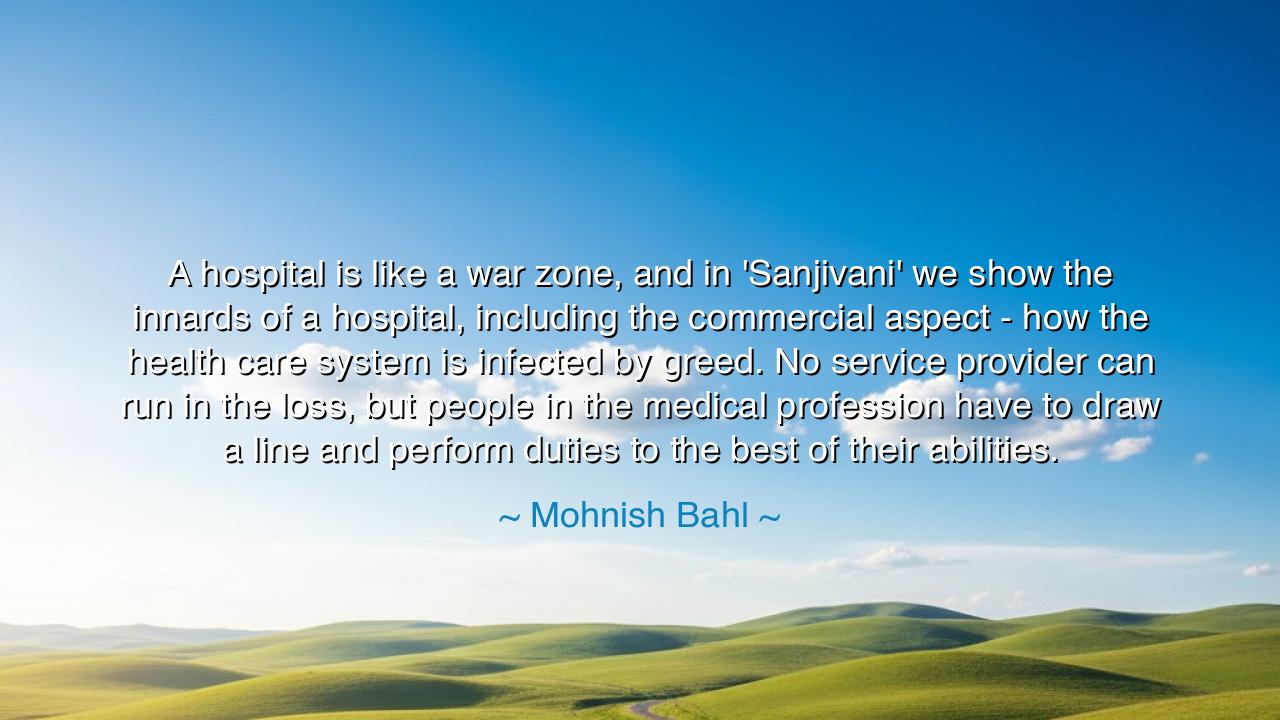
A hospital is like a war zone, and in 'Sanjivani' we show the
A hospital is like a war zone, and in 'Sanjivani' we show the innards of a hospital, including the commercial aspect - how the health care system is infected by greed. No service provider can run in the loss, but people in the medical profession have to draw a line and perform duties to the best of their abilities.






In the heartfelt and piercing words of Mohnish Bahl, the celebrated actor who portrayed the healer and the human within the halls of Sanjivani, we hear a truth both eternal and unsettling: “A hospital is like a war zone, and in ‘Sanjivani’ we show the innards of a hospital, including the commercial aspect — how the health care system is infected by greed. No service provider can run in the loss, but people in the medical profession have to draw a line and perform duties to the best of their abilities.” These words, though born from the world of storytelling, resonate like a moral anthem across centuries — for they speak not merely of medicine, but of the battle between duty and desire, between service and self-interest, between what heals the body and what corrupts the soul.
In this statement, Bahl reveals a profound paradox: that the hospital, a sanctuary meant for healing, often mirrors the chaos of a battlefield. Within its walls, life and death wage a relentless war — not only between disease and cure, but between conscience and commerce. Doctors, nurses, and healers stand as soldiers on this front, fighting not only against illness but against the creeping infection of greed that threatens to turn compassion into calculation. Yet, even as he acknowledges the inevitability of the world’s economy — that “no service provider can run in loss” — he calls upon the moral line, that invisible boundary where humanity must restrain its hunger for gain and honor its sacred duty to heal.
This wisdom is not new, but ancient as civilization itself. In the scrolls of history, the Hippocratic Oath — the vow taken by physicians since the days of ancient Greece — echoes the same truth: “I will remember that there is art to medicine as well as science, and that warmth, sympathy, and understanding may outweigh the surgeon’s knife or the chemist’s drug.” Even in the days of Asclepius, the god of healing, healers were warned that to treat illness for profit alone was to desecrate their divine gift. Thus, Bahl’s words are not merely commentary on a television drama; they are the modern echo of an ancient moral code — that medicine is not just a profession but a calling, a sacred duty that binds the healer to the divine law of service.
Consider, then, the story of Florence Nightingale, the “Lady with the Lamp,” who walked among the wounded in the Crimean War. Surrounded by filth, blood, and despair, she asked for no gold, no honor — only the chance to bring comfort where there was suffering. Her battlefield was a hospital, and she fought not with weapons but with compassion. Though she could have profited from her fame, she chose humility and service. In her, we see the embodiment of Bahl’s wisdom — that the true healer fights on two fronts: against disease and against the temptation to let greed dull the edge of mercy.
Yet, the war zone of the modern hospital is not fought only with syringes and scalpels. It is fought in boardrooms and balance sheets, where the price of care often overshadows its purpose. Mohnish Bahl, through his portrayal and reflection, lifts the veil from this hidden battlefield. He speaks for every doctor torn between the need to sustain their practice and the vow to heal without bias or greed. The health care system, as he says, is often infected not by germs but by profit — by the sickness of the human soul that forgets that healing, at its core, is an act of love.
Yet his message is not one of despair, but of redemption. Even in this system of corruption and compromise, there remains the power of choice. Every physician, every nurse, every human being who serves another stands daily at a crossroads: to give less than they can for more than they should, or to give all they can simply because it is right. To “draw a line,” as Bahl declares, is the act of courage that defines the noble from the merely skilled. For true greatness in any profession lies not in profit, but in principle.
So let this truth be carried forward, as the ancients would pass wisdom by firelight: the hospital may be a war zone, but every war needs heroes. Let each healer remember that they are not merchants of medicine, but stewards of life. And let every person who serves — in medicine or beyond — recall this sacred balance: that while the world may demand payment, the heart demands purpose.
For the lesson of Mohnish Bahl’s words is eternal — that no system, no profession, no soul is beyond redemption when guided by duty and compassion. To those who heal, do so with integrity. To those who lead, do so with humility. And to all who labor in the service of others, remember: the truest victory in the war for life is not the profit earned, but the life restored.






AAdministratorAdministrator
Welcome, honored guests. Please leave a comment, we will respond soon